Why do braces hurt? If you ask your grandmother, she might tell you that beauty is pain, but there’s actually a simple medical explanation. Braces hurt because your teeth are being pushed and pulled, creating pressure that causes increased sensitivity. They can also cause pain because of cuts and scratches from the metal brackets and wire.
The good news is that pain caused by dental braces is manageable, and anyone who has had severely crooked teeth will tell you that in retrospect, braces are usually worth it once you have a beautiful, straight smile.
In this article, we’ll go over:
- Why braces hurt
- When braces hurt
- What you can do to stop the pain
Braces pain can get a little bit uncomfortable sometimes, but with proper care, you can manage it. But, don’t worry its not always a painful experience. Keep reading to find out what to expect when you get your braces, and how to find relief when they do hurt.
You might be wondering how to stop braces pain immediately – there are a few things you can do, which we’ll discuss later in this article.
You might have also considered Invisalign aligners, since this treatment is less painful and has a range of benefits compared to fixed braces. If you thought about switching to invisible braces (aligners), but it’s not in your budget, we recommend to give SmileWhite Aligners a try.
These Aligners have the same benefits as Invisalign, and treat even complex cases – but, they have a much lower price tag! As a bonus, you’ll get free retainers and whitening to complete your perfect smile!
Simply book a FREE e-consultation to see whether they are a good option for you.
Use our discount code “DENTALY5OFF” to save an additional 5% on your treatment.
The phases of braces pain
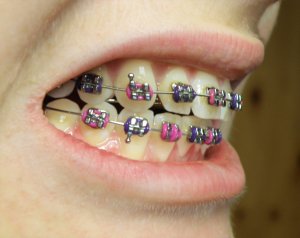
If you’ve ever had braces before, just reading this article is enough to trigger the memories of scratched inner cheeks, endless sores, and a constant aching radiating from your jaws. And, if you are just getting braces it’s a good idea to prepare yourself so you know what to expect and how to ease braces teeth pain or discomfort.
Let’s start by taking a look at when people tend to feel some pain during braces treatment.
Do braces hurt when you first get them?
Many people are afraid of getting their braces put on because they fear the process will be painful. Fortunately, actually getting your braces on doesn’t hurt. It’s what comes after that typically causes some pain, but don’t worry it doesn’t last forever. This is good news as some types of braces can have a lengthy treatment time!
During your appointment, your orthodontist uses dental cement to attach brackets to each tooth. The brackets are then connected with arch wires and secured with elastic bands. These bands are what give braces their colours.
When you’ve returned home you may start to think that getting braces isn’t that bad after all. But, eventually, you’ll begin to notice some soreness in your teeth and gums. It’s not unbearable, but it is constant. This soreness is caused by the wire and bands putting pressure on your teeth and slowly forcing them into their new position.
You may also experience sores on the inside of your cheeks or on your tongue from the metal brackets. The discomfort should ease significantly after a week, but it may take up to a month before you feel completely used to wearing your braces.
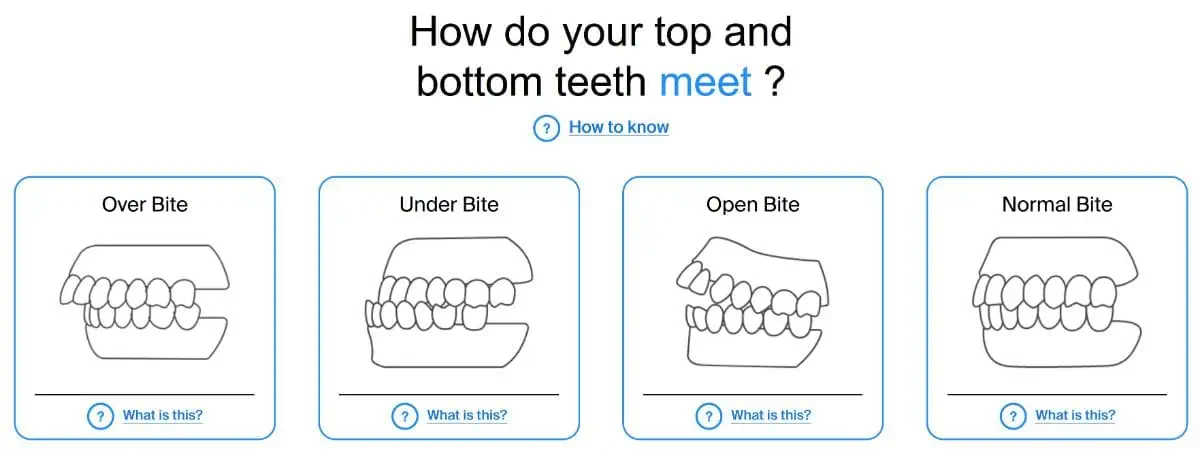
Is there pain while getting braces tightened?
As part of braces treatment, you’ll visit your orthodontist every two to four weeks to get adjustments. Your orthodontist will tighten your wires and springs, to ensure that your teeth keep moving in the right direction.
Getting braces tightened isn’t usually painful while it’s happening. However, after these adjustments, it’s normal to feel some soreness, similar to what you felt when you got your braces on. It won’t be as intense and should pass within a few days.
Do braces hurt when you get them off?
The process of getting braces off won’t hurt. However, after a few hours, you might notice some tenderness or even soreness. Similar to when you first had your braces put on, your teeth need time to adjust, in this case to the lack of pressure.
It’s possible you may experience a bit of soreness if your orthodontist needs to use some force to remove the brackets and glue. This tenderness will go away soon. In the meantime, you may want to stay away from hard foods that can cause you more discomfort.
Other reasons for braces pain
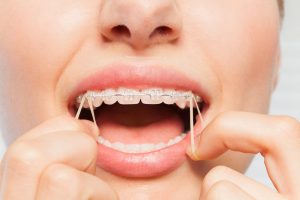
There are a few other reasons your orthodontic treatment may feel uncomfortable or cause you pain during treatment, these include:
- Pain from rubber bands – Can cause the same type of soreness as a brace tightening.
- Pain from power chains – Power chains are elastic ligatures that connect to each bracket and are used to close gaps between teeth quickly.
- Scratches and cuts from brackets – Hooks and bracket edges can catch on your cheeks or tongue.
Do aligners hurt less than braces?
In general, aligners hurt less than traditional train track braces because of the materials and movement involved. This study concluded that patients using Invisalign experienced lower levels of pain than those with fixed braces during the first few days of treatment.
But why does Invisalign hurt less than braces? For a couple of reasons:
- Less movement: Aligners are generally used for orthodontic treatment where only mild or moderate correction is needed.
- Smooth edges: Aligners don’t have pointy metal brackets that will poke and catch on your cheeks and tongue.
That doesn’t mean that aligners don’t hurt—they are moving your teeth after all. But, if you are eligible for aligners and want to avoid as much discomfort as possible, you may want to consider them.
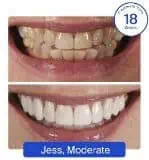
- Treats up to 90% of Cases
- Up to 40% cheaper than Invisalign
- Buy now, pay later in interest-free instalments
- Rated 4.9/5 on Trustpilot
- As seen on 5, BBC, 4, DailyExpress, TheMail
- Get 5% OFF with our discount code DENTALY5OFF and FREE Whitening and Retainers worth £790
How do you relieve pain from orthodontic treatment?
If you just got braces, you’re probably wondering how to get rid of braces pain. Thankfully, there are plenty of things you can do. Check out the following orthodontist recommendations:
1. Soft foods for sore teeth from braces
Be gentle with your teeth in the initial stages, and after getting them tightened. That means thinking twice before you bite into that apple, and be careful when chewing. Other foods that are safe to eat when your teeth hurt from braces include:
- Smoothies
- Ice cream
- Yoghurt
- Cold soups
You can also eat warm foods like mashed potatoes, but you may find that cold foods help to relieve inflammation and soothe your mouth more than hot foods.
2. Salt water rinses
Warm salt water rinses will not only help soothe the pain but will also work as an antiseptic to gently wash away bacteria and reduce swelling. This is recommended especially when dealing with soreness from power chains and rubber bands.
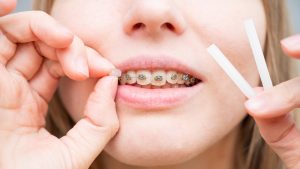
3. Orthodontic wax
If you experience sores from your brackets catching on your cheeks, you will quickly develop a profound love of orthodontic wax. Orthodontic wax is moulded over any bracket that causes you irritation, creating a soft protective barrier between your cheeks and your brackets.
If you find yourself covering nearly all of your brackets with orthodontic wax during the first week, or having a canker sore outbreak, you’re not alone. Just make sure to take the wax off when you eat and when you brush teeth with braces.
Your orthodontist will most likely provide you with a generous supply of wax, but you can also purchase it from pharmacies or on Amazon.
4. Anaesthetics
Fast relief from your braces pain can come from oral anaesthetics like Orajel or Anbesol. These can be applied directly to the affected areas and help to temporarily numb and relieve pain, whether on your lips, gums or cheeks.

5. Over-the-counter painkillers
Medication like Ibuprofen, Advil, or Tylenol can be taken after you get your braces on (or after you get them adjusted) to help relieve pain caused by your shifting teeth.
You can take the appropriate dosage of an over-the-counter painkiller before an orthodontic appointment to get a jumpstart on pain relief. Just make sure not to take too high a dosage and keep in mind that this type of medication isn’t meant for continuous usage.
6. Chill out
Literally! Cold will help reduce inflammation, whether it’s coming from swollen gums or cuts on your tongue and cheeks. Simply sip ice water throughout the day or use an icepack on the outside of your mouth.
7. Gum massage
If you’re experiencing pain from shifting teeth, you’ll know you’re willing to try just about anything to make it feel better. Just as you can massage your shoulders to relieve sore muscles, gently rubbing your gums in a circular motion can help.
In the following table, you can see a summary of the reasons for braces pain and their common remedies:
Source of Pain | Remedy |
Teeth moving |
|
Cuts from brackets |
|
Both |
|
And, in the video below, vlogger Emma Louise gives her best braces life hacks for how to relieve pain from braces. She starts the video with cleaning tips and other hacks that you will also find interesting! You’ll see that the methods are pretty universal.
Conclusion
The process of moving teeth is bound to cause some pain or at least some discomfort, but some people experience more than others. It can be internal, caused by the actual shifting of your teeth, or external, caused by cuts and sores where the soft tissues of your mouth come into contact with the metal brackets.
Braces pain is no reason not to straighten your teeth. There are plenty of ways to alleviate your pain, including cold compresses, orthodontic wax, and over-the-counter painkillers.
Different kinds of braces may be less painful and if you need only mild to moderate correction, you may be able to opt for invisible braces or clear aligners. Clear aligners typically straighten teeth with considerably less pain than traditional braces.
FAQs
Does it hurt to get braces on?
The actual process of getting your braces glued to your teeth doesn’t hurt. It will certainly feel weird at first, but a few hours later you will begin to notice some discomfort. But, that’s good! It means that your teeth are beginning the process of moving into alignment.
You can ease discomfort by taking over-the-counter painkillers, drinking ice water, or using a cold compress on the outside of your mouth.
How long do braces hurt when you first get them?
Your braces will hurt for the first couple of days after getting them and you may experience some cuts from the brackets. By the end of the first week, they should be slightly less uncomfortable. When you get your braces tightened, you might feel some pain again, but it will only last for a couple of days.
How long do braces hurt after tightening?
Braces pain after tightening should only last for a short time, and it shouldn’t last as long as when you had your braces put on. And its normal for rubber bands or chains to add to the pain.
Does it hurt to get braces off?
Getting your brackets taken off doesn’t hurt. However, your orthodontist may have to use some force to remove the brackets and the glue. This can leave your mouth feeling a bit tender afterwards. You also may notice some tenderness simply from the absence of pressure your teeth had gotten so used to.
NCBI. Pain level between clear aligners and fixed appliances: a systematic review. Consulted 11th August 2021.




